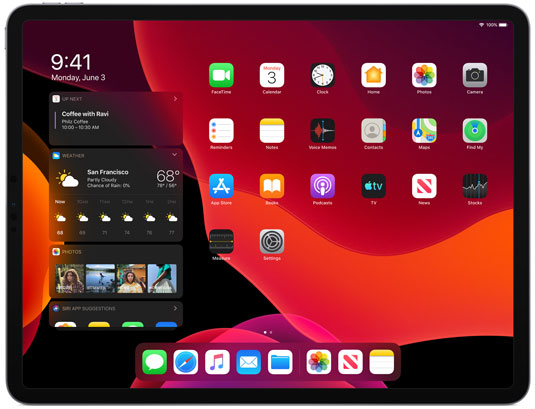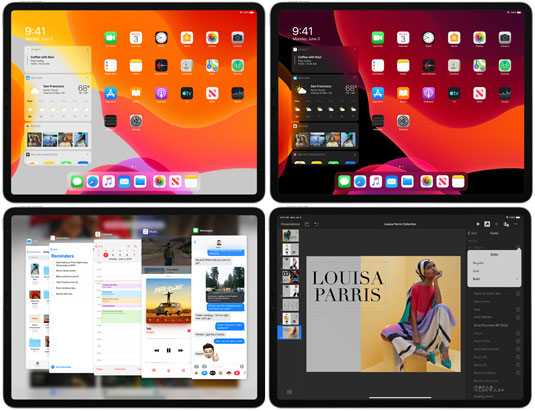Hosted by site sponsor WebMate.
iPad Q&A
Revision Published November 15, 2021
All Apple Q&As >> iPad Q&A (Home) | Also see: All iPad Specs
To be notified of new Q&As, sign up for EveryMac.com's bimonthly email list.
Which iPad models support iPadOS (13)? Do some models "partially" support iPadOS (13)? Which ones?
For iOS 13, Apple formally rebranded the operating system on iPad models as "iPadOS" to emphasize features created specifically for the iPad. Many of these features combine to make the devices far more "full computer-like" than ever before.
Apple first previewed iPadOS (13) on June 3, 2019. It first was released as a "public beta" on June 24, 2019 and was released in its "final" version for consumers on September 24, 2019.

Photo Credit: Apple, Inc. (iPadOS Dark Mode on iPad Pro)
Apple specifies general iPadOS compatibility in its official press release, and a few specific details in fine print elsewhere, but additional information can be useful, too.
New iPadOS 13 Features
In the company press release, Apple explains that:
iPadOS builds on the same foundation as iOS, adding powerful new capabilities and intuitive features specific to the large display and versatility of iPad. Introducing new ways to work with apps in multiple windows, more information at a glance on a redesigned Home screen and more natural ways to use Apple Pencil, iPadOS also benefits from the great new updates in iOS 13, making it the perfect device for consumers and creative pros alike.
The "new ways to work with apps in multiple windows" is such a boost to productivity that it alone would merit an upgrade to the iPadOS for those with compatible iPad models. There are other wonderful additions, as well, though.

Photo Credit: Apple, Inc. (iPadOS Features)
Significant new features provided by the iPadOS include:
- New Home Screen: Borrowed from Android tablets, Home Screen now has a denser icon layout and a new "Today View" for weather, news, and other widgets.
- Improved Split View & Slide Over: Hooray! It's now possible to work with multiple files or documents from the same app side-by-side in "Split View" and quickly view and toggle between different apps using "Slide Over."
- Enhanced Apple Pencil: Faster performance, a better tool palette, and more.
- Improved File Manager: Support for external drives, iCloud virtual drives, SMB file servers, additional folder views, local storage access, zip and unzip, and much more.
- Desktop-Class Safari: Proper support for desktop versions of websites for significant improvement to interaction with many webapps.
- Improved Text Editing: Vastly improved selection options for text, faster gestures, and a huge number of new key commands borrowed from the macOS.
- Custom Fonts: For system-wide use across iPad apps for the first time.
As if those massive reasons weren't enough to upgrade already, there are improvements in speed, storage efficiency, security, and privacy as well as a slick new "Dark Mode" interface option.
The iPadOS does drop support for some older iPad models.
Specifically, Apple's press release notes that iPadOS supports "iPad Air 2 and later, all iPad Pro models, iPad 5th generation and later and iPad mini 4 and later."
Accordingly, this means that the iPadOS does not support the Apple A7-powered original iPad Air, iPad mini 2, and iPad mini 3 models.
A full list of supported iPad devices is below. New feature support is practically identical, but two feature differences are documented below.
Identification Help (Skip)
If you are not certain which iPad you have, all models can be identified externally by Model Number precisely enough to determine whether or not it is supported by the iPadOS.
These specific iPad devices support iPadOS:
iPadOS Compatible iPads |
Model No |
If your iPad isn't listed above -- and it isn't a newer model that shipped after iPadOS 13 was released on September 24, 2019 and before iOS 14 or later versions of the iOS were introduced -- it isn't compatible with the operating system.
You might also consider using the Order Number for identification, which is specified as "Model" within the iOS "Settings" app under General > About.
For example, in the United States, this "Model" within the iOS looks like MUXP2LL/A, which specifically refers to an iPad mini 5th Gen in Gold with 256 GB of storage.
Everyi.com's Ultimate iLookup feature can identify these devices by order numbers from around the world and by device Serial Numbers, too.
All of the above iPad devices run the iPadOS, but in fine print, Apple notes that only the iPad Pro 11" and iPad Pro 12.9" (3rd Gen) models support Dolby Atmos audio.
Additionally, only the iPad Pro 11" and iPad Pro 12.9" (3rd Gen), iPad Air 3rd Gen, and iPad mini 5th Gen models support the "Motion Capture" and "People Occlusion" features for Augmented Reality.
Finally, in conjunction with a Mac running macOS Catalina (10.15), the iPad 6th Gen and later, iPad mini 5th Gen and later, iPad Air 3rd Gen and later, and all iPad Pro models support the "Sidecar" feature that allows an iOS 13-powered iPad to be used as a second display for the Mac.
If you have an older Mac or an older iPad, you instead can use one of the third-party apps that provide this external display capability before Apple copied their functionality and integrated it with their operating systems.
iPadOS 13 Summary
Ultimately, the iPadOS might very well be the most substantial upgrade to the iOS that Apple ever has shipped. The improvements in interface, key commands, file management, external storage support, and much more definitely combine for a compelling upgrade for those with compatible iPad models. iPadOS makes the iPad a far more productive device than ever.
When it was released in beta, Everyi.com recommended that users leave beta testing to those who do not use their iPad for "mission critical" tasks and even wait for a "bug fix" update or two before upgrading to the final version of the iPadOS, as well. After the release of a couple of bug fix updates, though, there was little reason not to upgrade to iPadOS (13); it is a compelling upgrade for sure.
Permalink | Report an Error/Typo | Sign Up for Site Update Notices
<< iPad Q&A (Main) | All Apple Q&As
Established in 1996, EveryMac.com has been created by experts with decades of experience with Apple hardware. EveryMac.com includes, and always has included, original research incorporating detailed, hands-on inspection of packaging, computers, and devices as well as extensive real-world use. All information is provided in good faith, but no website or person is perfect. Accordingly, EveryMac.com is provided "as is" without warranty of any kind whatsoever. EveryMac.com, and the authors thereof, shall not be held responsible or liable, under any circumstances, for any damages resulting from the use or inability to use the information within. For complete disclaimer and copyright information please read and understand the Terms of Use and the Privacy Policy before using EveryMac.com. Copying, scraping, or use of any content without expressed permission is not allowed, although links to any page are welcomed and appreciated.
